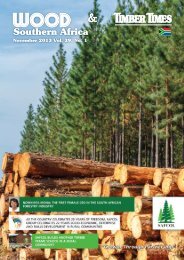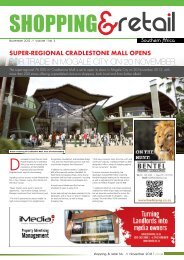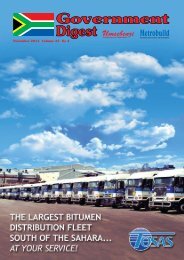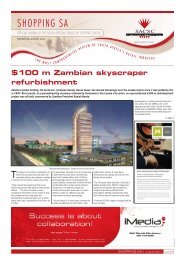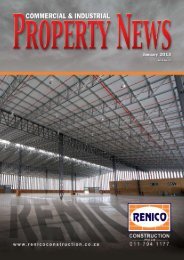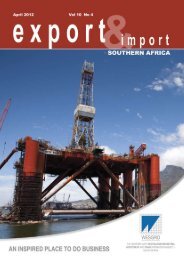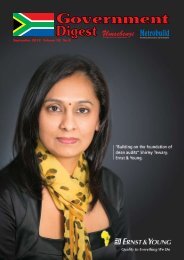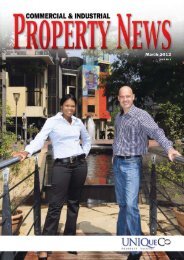April 2011 - Malnor
April 2011 - Malnor
April 2011 - Malnor
Create successful ePaper yourself
Turn your PDF publications into a flip-book with our unique Google optimized e-Paper software.
�<br />
�<br />
�<br />
�<br />
�<br />
�<br />
There are no restrictions on foreign<br />
investment in Gabon, but the state<br />
reserves the right to invest in ventures<br />
established in strategic sectors such as<br />
the oil and mining industries.<br />
The country has a wealth of agricultural<br />
and fishery resources but these have<br />
been largely neglected and are therefore<br />
underdeveloped. Most of the population<br />
relies on subsistence farming. The<br />
country is also very dependent on<br />
timber and manganese exports.<br />
Gabon’s oil industry is critical to the<br />
country’s economy as it’s a major<br />
source of foreign exchange, accounting<br />
for 45% of GDP, 80% of exports and<br />
60% of budget revenues on average over the last five<br />
years. It is the fifth largest oil producer in sub-Saharan<br />
Africa. Analysts do expect declining oil revenues despite<br />
many arguing that the oil fields have passed their peak<br />
production. The fluctuations in global prices and demand<br />
for commodities led to an economic contraction of 1,4%<br />
in 2009, the first time since 2000.<br />
The country has an oil refinery at Port Gentil and hosts<br />
a number of international oil companies that are active<br />
in the distribution and marketing of petroleum products.<br />
Economic growth rebounded in 2010 with a real GDP<br />
growth rate of 5,4% as the global economy and<br />
commodity prices recovered. GDP composition by sector:<br />
industrial sector 63%, services sector 33% and the<br />
agricultural sector 4%.<br />
The business environment slightly improved in Gabon.<br />
The risk of doing business improved, but it’s still<br />
relatively more difficult and costly to do business in<br />
Gabon compared to other economies in the world. The<br />
country ranked 156 out of 183 countries in <strong>2011</strong>, an<br />
improvement from a rank of 158 in 2010.<br />
The government is implementing various reforms<br />
including the elimination of lengthy regulatory procedures<br />
to enhance the business environment for private sector<br />
promotion. The IMF emphasised the importance of<br />
transparent and accountable management of resources<br />
from the country’s extractive sector and identified the<br />
limited access to financial services as a deterrent to<br />
private sector growth.<br />
EXPORT & IMPORT SA // APRIL <strong>2011</strong><br />
�<br />
�<br />
�<br />
�<br />
�<br />
Credit Guarantee country profile<br />
The government is focusing on the development of wood<br />
processing, light metallurgy and ecotourism and energy<br />
in an attempt to diversify economic activities as oil fields<br />
are reaching maturity.<br />
In January this year, the president reshuffled his cabinet<br />
in an attempt to speed up the reform process as he<br />
criticised some members for the slow pace of economic<br />
reform. The president aims to use the remaining oil<br />
wealth to fund $11 billion of spending over his sevenyear<br />
mandate to transform the country into a diversified,<br />
regional economic powerhouse. This comes after the IMF<br />
last year blamed administrative inefficiencies and<br />
resistance to reforms from within the ruling elite for<br />
slowing plans for investment set aside in Bongo’s 2010<br />
budget. Aside from demanding an audit of the bloated<br />
civil service and seeking to help businesses by<br />
centralising tax collection, Bongo has also focused on<br />
increasing foreign direct investment and upgrading the<br />
country’s infrastructure.<br />
In January <strong>2011</strong> the government announced that it will<br />
cut VAT on selected consumer goods including cement<br />
and a three-year price cap on cooking gas in an attempt<br />
to slow the rise in the cost of living as part of an<br />
agreement with trade unions. The EIU reported that the<br />
government is also planning to boost benefits including<br />
bonuses, housing and travel allowance that will increase<br />
salary packages in an attempt to fulfil an electoral<br />
pledge of the president.<br />
Some commentators believe it will be politically difficult<br />
for Bongo to accelerate the pace of reform before midterm<br />
legislative elections due in December and that the<br />
success of his term could depend on whether he<br />
emerges from the polls with a solid majority.<br />
The president successfully completed a visit to Asia to<br />
attract more foreign direct investment in the non-oil<br />
sector. One of these activities includes the signing of a<br />
$1,7 billion joint venture investment project by the<br />
Gabonese government with Olam International Limited,<br />
a Singaporean multinational and leader in the agro-food<br />
processing sector. This is estimated to be the largest<br />
investment deal signed in West Africa. The project will<br />
boost development in Gabon’s fertilizer and palm oil<br />
industries with a job creation capacity of approximately<br />
21 000 jobs directly and indirectly. Construction of the<br />
factory is expected to commence in <strong>April</strong> <strong>2011</strong>.<br />
to page 26<br />
23



